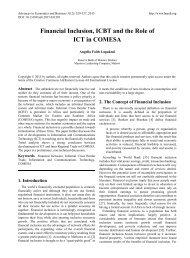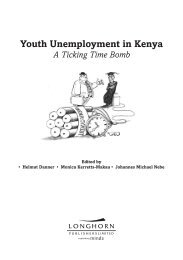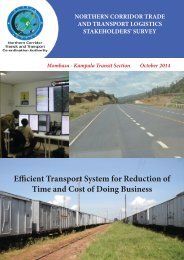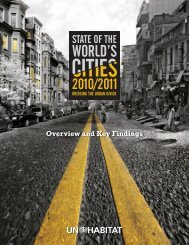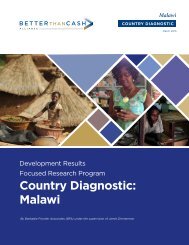FD
gvti301SEaf
gvti301SEaf
Create successful ePaper yourself
Turn your PDF publications into a flip-book with our unique Google optimized e-Paper software.
Yours and Mine<br />
Arun Sundararajan<br />
The Sharing Economy<br />
The End of Employment and the<br />
Rise of Crowd-Based Capitalism<br />
MIT Press, Cambridge, Massachusetts,<br />
2016, 256 pp., $26.95 (cloth).<br />
The sharing economy is<br />
transforming commerce right<br />
before our eyes. Thousands are<br />
skipping the hassle of standing on a<br />
corner in the rain to hail a cab and are<br />
simply summoning an Uber or Lyft to<br />
whisk them to the airport. Others are<br />
selling their knitting on Etsy, letting<br />
strangers stay in their home through<br />
Airbnb, or having their weeds pulled<br />
by a gardener hired via TaskRabbit.<br />
Countless “workers” are flocking to<br />
Amazon’s Mechanical Turk to complete<br />
“Human Intelligence Tasks” for<br />
just pennies.<br />
Sharing economy expert and New<br />
York University Stern School of<br />
Business professor Arun Sundararajan<br />
tackles the myriad issues these<br />
developments have spawned in his<br />
path-breaking book.<br />
Sundararajan knows his stuff. He’s<br />
an award-winning scholar who writes<br />
with a clarity that masks the complexity<br />
of his subject. Citing his own<br />
research and that of many others, he<br />
explains how organizations whose<br />
main purpose is to create the supply<br />
needed to meet consumer demand<br />
are driving today’s economy. He explores<br />
how these developments spell<br />
the end of employment as we know it<br />
and what society should do to shield<br />
the American worker from the worst<br />
Darwinian aspects of crowd-based<br />
capitalism.<br />
Sundararajan divides the book into<br />
two logical parts, cause and effect,<br />
with each of eight main chapters addressing<br />
a concrete topic. If you’re befuddled<br />
by the notion of blockchain<br />
technology and bitcoin or wonder<br />
exactly how a “platform” differs from<br />
a “hierarchy,” you’ll find the answers<br />
in this enormously helpful and comprehensive<br />
book.<br />
Sundararajan identifies five core<br />
characteristics of the sharing economy.<br />
It’s largely market based, puts<br />
underutilized capital to use, relies on<br />
crowd-based networks, and blurs the<br />
lines not just between the personal<br />
and the professional, but also between<br />
employment and casual work.<br />
What generated this crowd-based<br />
capitalism? Apple’s Steve Jobs and the<br />
iPod, says Sundararajan. The iPod<br />
was the first successful mass-market<br />
product developed primarily for consumers,<br />
rather than for business or<br />
government, and ever since, the most<br />
important innovations—think the<br />
iPhone, iPad, and Facebook—have<br />
centered on the consumer.<br />
Trust is essential to this economy.<br />
Our 20th century relatives would<br />
have been reluctant to allow strangers<br />
to drive their cars or stay in their<br />
homes while they were on vacation<br />
on a mere promise to pay. Yet thousands<br />
of people do these things every<br />
day because the digital economy has<br />
created a network we can trust.<br />
It has generated positive spillover<br />
effects by putting underused assets<br />
to work and expanding economic<br />
opportunity. Yet it has also spawned<br />
negative externalities—your neighbor<br />
might not like the comings and<br />
goings of your Airbnb “guests”—and<br />
weak regulation has certainly helped<br />
the sharing economy grow. For<br />
example, Airbnb might struggle to<br />
survive if its casual hosts had to meet<br />
the same fire, safety, and other regulations<br />
that govern conventional hotels.<br />
Sundararajan advocates giving<br />
regulatory responsibility to the peerto-peer<br />
marketplace and allowing<br />
new self-regulatory organizations to<br />
fill the gap. But he may be overestimating<br />
the private sector’s ability to<br />
provide sufficient consumer protection.<br />
Although keeping government<br />
regulators at bay may seem<br />
necessary to incubate the sharing<br />
economy, consumers may have to<br />
suffer through lots of dangerous rides,<br />
filthy apartments, and ruined gardens<br />
before the “collaborative” market<br />
sorts things out.<br />
Trust is essential<br />
to the sharing<br />
economy.<br />
I would have liked to see additional<br />
data on compensation. For example,<br />
Sundararajan asserts that workers can<br />
generally expect to earn a higher hourly<br />
wage through freelance assignments<br />
than through traditional channels,<br />
citing plumbers in San Francisco as<br />
evidence. But this assertion is misleading<br />
for two reasons. First, hourly wage<br />
data don’t include benefits, which<br />
typically account for 20 to 30 percent<br />
of total compensation. Second, it’s<br />
one thing to earn a wage premium<br />
for an hour or so of freelancing, but<br />
it’s another to find a year’s worth of<br />
freelance work at that rate. Many freelancers<br />
would love to make the kind<br />
of money—about $66,500 a year—San<br />
Francisco’s plumbers earn.<br />
This point doesn’t detract from the<br />
high quality of Sundararajan’s book,<br />
which is essential to understanding<br />
how today’s crowd-based capitalism<br />
beats yesterday’s industrial revolution.<br />
In Adam Smith’s world, the market’s<br />
invisible hand led supply and demand<br />
to intersect. In Sundararajan’s world,<br />
the invisible hand is still at work. It’s<br />
just that it now has help from peer-topeer<br />
funding, impersonal platforms,<br />
blockchain technology, and those<br />
ubiquitous apps.<br />
Joann M. Weiner<br />
Director, MA in Applied Economics,<br />
The George Washington University<br />
Author, Company Tax Reform<br />
in the European Union<br />
Finance & Development June 2016 57




